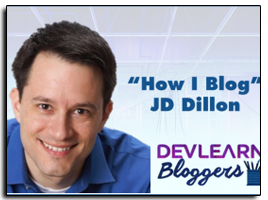Share … Share constantly … and SHARE LOUD!
I’m not going to argue the merits of or outline a full strategy for working out loud (WoL). For that discussion, read this, this, this, or this. While I completely agree with the value behind WoL, it wasn’t until I found my personal WIIFMs that it really started to make a difference in how I do my work.
Here are the 5 most important reasons for why I choose to work out loud …
It makes me better (aka personal improvement).
We L&D geeks constantly talk about the value of reflection. I began to realize the importance of reviewing my own work while hosting radio shows in college. My cohost and I recorded every episode on CD, and I would listen to them in my car on the way to/from my night job (mostly to laugh at my own jokes – at least to start). Over time, I used this listening pattern as an opportunity to improve my delivery. Years later, I pulled out my CD case and started listening again, realizing how much I had developed in my speaking ability to communicate simple, concise ideas in engaging ways. I also found gaps that continued years later and again used those recordings to up my game – this time as a professional facilitator.
We too often focus reflection on the period immediately following the work, such as during a post-project review. While that is certainly an important part of iterative improvement, consistently working out loud gives me a chance to reflect on more than just the end result. I can look back on my thought process, decision-making, opinions, communication style, and more nuanced skills and behaviors over time and identify trends that help me improve in more meaningful ways. Beyond sharing my ideas and opinions on the industry, I use my blog, Twitter feed, personal journal, and notes to evaluate my progress and identify areas for continued improvement.
You never have to wonder what I’m thinking about or doing (aka transparency).
Plenty of professionals and organizations tout the value of transparency, but then the work starts to get “foggy” when sharing becomes difficult or inconvenient. To me, WoL is the ultimate in workplace transparency. Through established mechanisms and processes, I have a way to keep everyone updated with my work – without calling extra meetings or sending piles of recap emails. Do I expect everyone to pay attention/listen/engage? Of course not. However, if you do want to know what I’m up to or where I stand on a particular workplace topic, I’ve got you covered.
No single tool or process in my work will facilitate the almost crystal clear level of transparency I seek. Therefore, I have a strategic mix of sharing methods …
- Blog posts for long-form exploration of complex topics/work items
- Discussion forum posts for shorter (but still a few paragraphs) updates
- Teamwork Project quick summaries at predetermined intervals (sometimes daily) for large projects
- HipChat for open conversation within the workflow
- Google+ updates for the more personal, fun side of work
- Confluence status updates for general mindset or workplace theme statements
Just reading that list, it sounds like a lot of work – even to me. Yes, it took a while to find the right mix of tools to align to the type of sharing I wanted to do. Yes, I had to adjust my behaviors and improve my WoL habits over time. Yes, I have a few blocks of scheduled time in my calendar for drafting long-form WoL pieces. Now – it’s just a reflex for me to share what I’m doing/thinking as I do/think it via these platforms/processes.
My knowledge and experience is there for you to see (aka credibility).
Why should people at my workplace listen to me or accept my opinions? Is my title impressive enough? Have I been with the company long enough? Is my boss bigger and badder than their boss? I don’t think any of that matters. It all comes down to credibility. If I’ve worked with someone in the past and we achieved mutual success, I’d hope credibility is already present. However, what if I haven’t worked directly with this person? What if my idea is on a new topic that we have not previously discussed?
Let’s use the science of learning (aka brain science) as an example. I’m not a scientist. I’m not an academic. I don’t have an accelerated degree in neuroscience. Why should anyone in my workplace believe that I know what I’m talking about when it comes to how the brain works in relation to learning and performance – especially if we haven’t talked about it in the past? After all, they haven’t witnessed the hours of reading and engaging with SMEs that takes place behind the scenes.
While it’s still up to me to prove my knowledge on the topic within the work, I also have backup – namely dozens of discussion forum entries, blog posts, and resources I’ve shared during the past year+ on the topic based on my efforts outside the office. Before I meet with someone to discuss the subject for the first time, I curate and share a list of posts for them to review to establish not only baseline topical understanding but also my initial credibility. This way, I have a smaller wall to overcome when engaging in timely, meaningful work related to the topic.
By consistently sharing my evolving thoughts and work around any given topic, I build a baseline level of enterprise credibility that can be formally “cashed in” when I need people to quickly (and sometimes blindly) buy into my ideas.
Some ideas turn into formal stuff (aka documentation).
Documentation is a pain in the ass. That’s a big part of the reason so many companies are horrible at capturing organizational knowledge. It’s difficult, time consuming work, and it almost never fits into a pre-determined project timeline. We could improve through long-term iteration, but we usually just jump to the next project – assuming that what was “enough” at the beginning will suffice over time. Therefore, we’re left with piecemeal documentation that covers the bare minimum but doesn’t support continued knowledge/skill growth.
What if we started the knowledge capture process early – during initial ideation. Then, if the concept evolves into a formal process or product, we evolve those initial shared materials into comprehensive formal documentation. Crazy, right?!?!
When I begin working out the concept for a new strategy or process, I typically start at a white board. I then take pictures of my scribbles and collect my thoughts into more cohesive notes. Those notes then serve as the foundation of a series of blog posts that help me (1) work out the idea further, (2) collect feedback from peers, and (3) establish a base for future documentation. When drafting these concept posts, I always keep possible documentation needs in mind to inform my style of writing – balancing informal discussion with slightly more traditional technical writing. This lets me copy/paste directly from blog posts into documentation articles down the line. I apply the same concept within my formal project work – capturing my thoughts along the way via a project blog that provides potential source for future documentation.
This is what I leave behind (aka succession).
Forget generations – the reality of the modern workplace is that most people aren’t going to retire with their current employers. They will leave when they find better opportunities (or their companies “reorganize”). So, when you leave your current role, how much institutional knowledge will you be taking with you? How much of your highly-valued, complex decision-making process can you communicate to your replacement during your final 2 weeks? Not nearly enough IMO …
When I leave, I won’t have to rush to shove everything I know into the minds of those who will remain behind. Actually, I’ve been setting them up for success for 4 years – without any plans to leave. My ideas, opinions, processes, and resources will live on via my various WoL mechanisms. More importantly, the HOWs of my role – the really complex stuff that’s hard to communicate directly – are there as well in the evolution of my sharing. While even I can’t completely explain how I do what I do sometimes (not that it’s really that impressive), my peers have the ability to follow my thought process as I explore my work during a period of several years – perhaps gleaning more useful information from what I didn’t specifically write down and maybe wasn’t even personally aware of at the time. The WHATs are all there … The HOWs are in between the lines for all to examine.
Why do you WoL? What tangible benefits have you realized from the extra time/effort it takes to share within the workflow?


